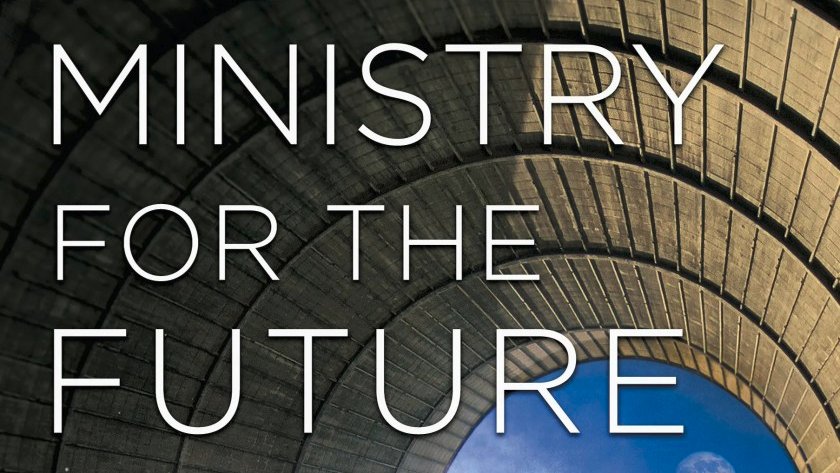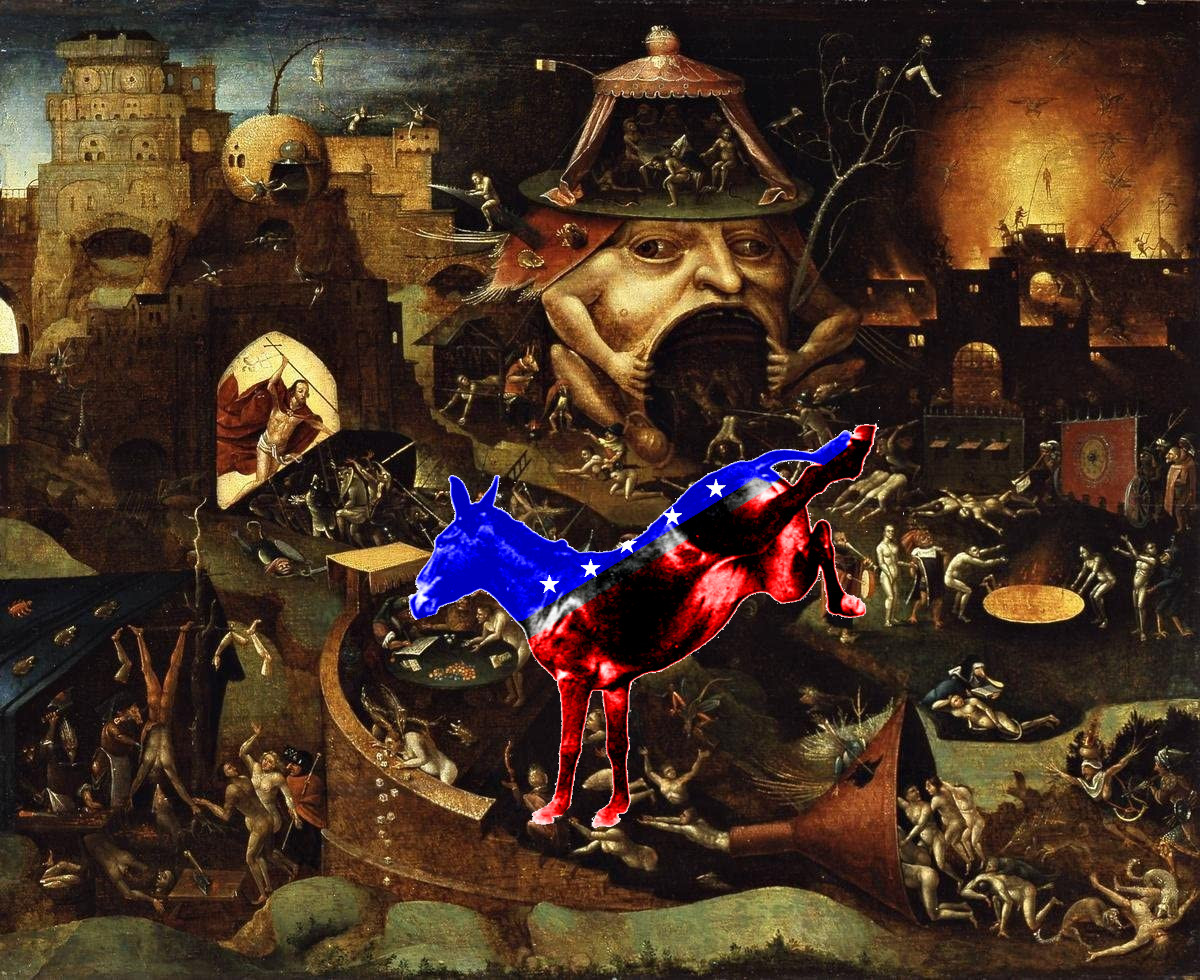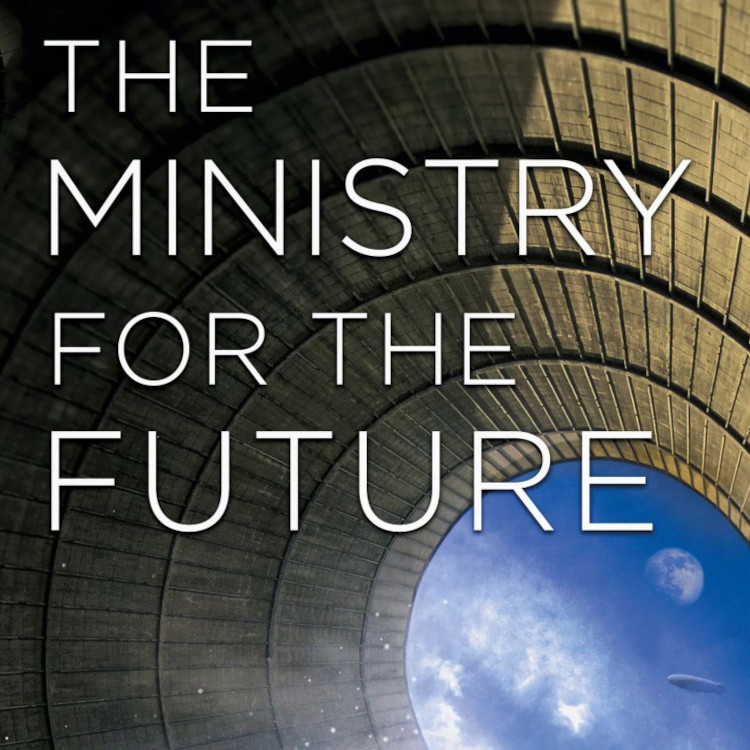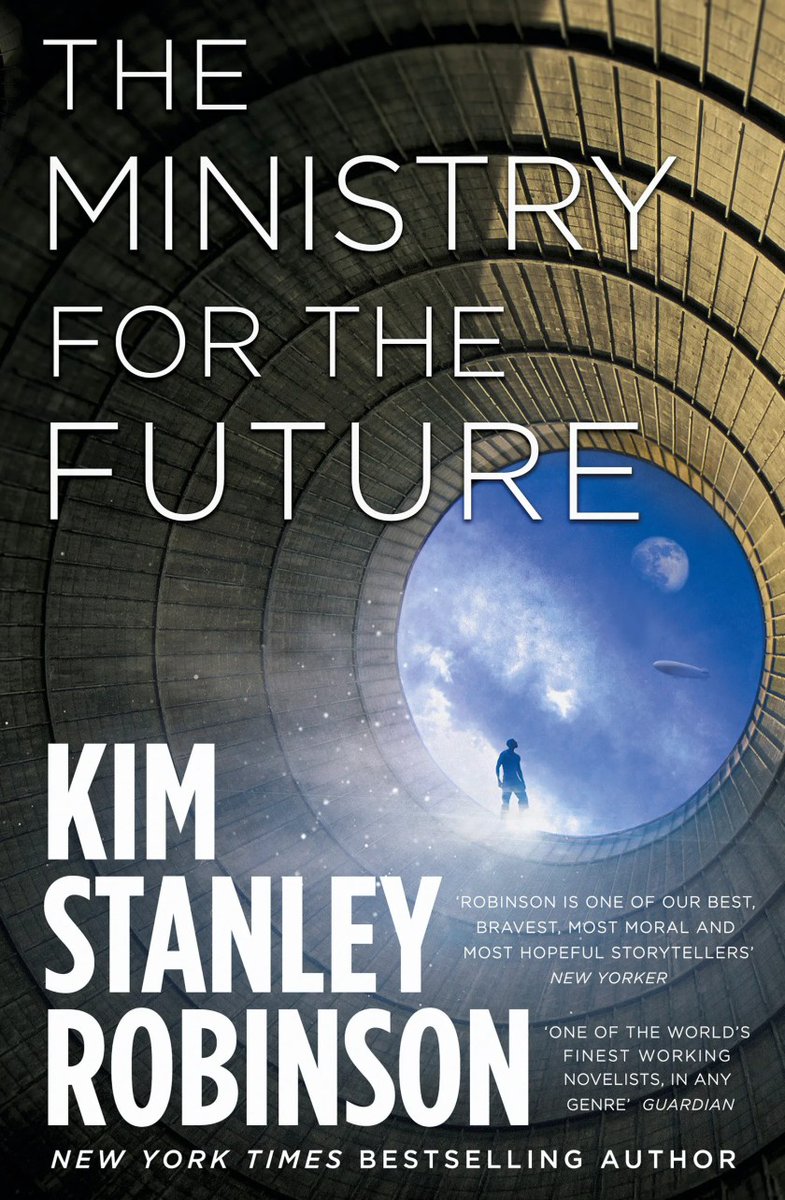
Kim Stanley Robinson's 2020 novel "The Ministry for the Future," is a fierce imaginative work. Robinson doesn't just depict a future beyond the climate emergency and capitalism itself, he depicts the specific, wrenching transition that takes us there.
orbitbooks.net/orbit-excerpts…
1/
orbitbooks.net/orbit-excerpts…
1/

(If you'd like an unrolled version of this thread to read or share, here's a link to it on pluralistic.net, my surveillance-free, ad-free, tracker-free blog:)
pluralistic.net/2021/05/12/sem…
2/
pluralistic.net/2021/05/12/sem…
2/
As I wrote in my review, the (variously attributed) maxim "It is easier to imagine the end of the world than the end of capitalism," isn't quite right. Imagining postcapitalism is an easy lift, but imagining the path to that world is VERY hard.
pluralistic.net/2020/12/03/min…
3/
pluralistic.net/2020/12/03/min…
3/
Robinson didn't leap into this project - he's been working up to it for literally decades, at least since the publication of the "Three California" books, which include one of the most uplifting novels I've ever read, PACIFIC EDGE:
memex.craphound.com/2015/01/15/pac…
4/
memex.craphound.com/2015/01/15/pac…
4/
Meanwhile, his 2312/Aurora/New York 2140/Red Moon novels constitute a kind of rangefinding exercise, starting 300 years the future and then walking his projection backwards to find a plausible route to get there.
memex.craphound.com/2017/03/18/new…
5/
memex.craphound.com/2017/03/18/new…
5/
But all these brilliant novels really seem to be warmup exercises for the main event, The Ministry for the Future, which depicts the intermeshed systems of economics, politics, geoengineering, streetfighting and tragedy that might rescue us from dying in our own waste-gases.
6/
6/
It's urgent, frightening and hopeful, raising as many questions as it answers.
These questions are now taken up in one of @crookedtimber's "seminars": a series of interdisciplinary essays about the book, culminating in the author's response.
crookedtimber.org/2021/05/03/the…
7/
These questions are now taken up in one of @crookedtimber's "seminars": a series of interdisciplinary essays about the book, culminating in the author's response.
crookedtimber.org/2021/05/03/the…
7/
The first of these essays comes from @mariafarrell: "What is Ours is Only Ours to Give," about the digital technology at the core of TMFTF, namely blockchain and independent social media. Farrell is characteristically incisive on these elements.
crookedtimber.org/2021/05/04/wha…
8/
crookedtimber.org/2021/05/04/wha…
8/
Her thoughts here tie back to her notion of the "prodigal tech bro," and how we should treat the tech industry's claims of genius with skepticism - even when those claims are cloaked in confessions of being an EVIL genius.
crookedtimber.org/2020/09/23/sto…
9/
crookedtimber.org/2020/09/23/sto…
9/
The next essay is @Eaterofsun's, digging into the solar geoengineering in TMFTF, and the "sustained contradiction" such an effort might produce - relieving the urgency of addressing carbon production and accumulating new policy debt in the process.
crookedtimber.org/2021/05/05/on-…
10/
crookedtimber.org/2021/05/05/on-…
10/
Morton's a very good choice for this role: his 2016 book on geoengineering, "The Planet Remade," remains one of the best technological, economic and political overviews of the subject:
memex.craphound.com/2016/05/04/the…
11/
memex.craphound.com/2016/05/04/the…
11/
Next is @greenprofgreen's "Can the World’s Bankers Really Save the Climate?" which drills into Robinson's fictional carbon markets, where central bankers are pressed into service to save the planet in an unjust (but rapid and necessary) compromise.
crookedtimber.org/2021/05/06/can…
12/
crookedtimber.org/2021/05/06/can…
12/
Green's an expert on climate and finance, so she's as good at spotting the cards that Robinson palms here as Farrell is with tech. Green credits Robinson with identifying the "true sources" of climate obstruction, but thinks he's missed the mark on how to deal with them.
13/
13/
Next is the @rooseveltinst's @toddntucker with "Ministry for Your Future Soul": praise for KSR's depiction of the scientific process, scientists, policy wonks, and the progress of policy. Tucker calls Robinson a "Gramscian science fictionologist."
crookedtimber.org/2021/05/07/min…
14/
crookedtimber.org/2021/05/07/min…
14/
Robinson's "dynamic imagination...makes the book valuable to policy nerds" because "fiction can inform planning," specifically through that exercise of starting with the outcome we want and then working backwards to imagine the steps we need to get there.
15/
15/
This "backcasting" method has many and varied adherents. It's the method that Anonymous used to create its notorious ops, as documented in @BiellaColeman's 2014 book on the ensemble:
spectator.co.uk/article/the-an…
16/
spectator.co.uk/article/the-an…
16/
But it's also the method that Amazon uses for new product decisions: starting by writing the press-release announcement and then working backwards to sell the org on developing the product to go with the press-release:
inc.com/justin-bariso/…
17/
inc.com/justin-bariso/…
17/
Next is @bellewaring's "Sudden Tempest of Ultimate Summer," which goes straight for the political violence in TMFTF, and KSR's seeming discomfort with this violence, coupled with his evident belief in its necessity.
crookedtimber.org/2021/05/10/the…
18/
crookedtimber.org/2021/05/10/the…
18/
As Waring points out, alongside all the nonviolent tactics Robinson depicts, there is a lot of (mostly offstage) violence - and when that violence is onstage Robinson pivots away from it, subjecting the Davos hostages to Powerpoint presentations instead of a firing squad.
19/
19/
Waring also grapples with the intimate, gendered role that violence plays in the book - the relationship between heroine Mary Murphy and the traumatized antihero Frank May, who holds her hostage, and whom Murphy subsequently dedicates herself to.
20/
20/
The next installment - Half the Earth? - comes from @JohnQuiggin, a trained agricultural economist who delves into Robinson's depiction of a successful "Half Earth" transition in which humans surrender half our planet to other animals.
crookedtimber.org/2021/05/11/hal…
21/
crookedtimber.org/2021/05/11/hal…
21/
Quiggin is pretty bullish on the possibility of this happening, noting that we have more than enough food as things stand and that human fertility is already below the replacement level everywhere except Africa, where it's still trending down.
22/
22/
For Quiggin, vacating half the Earth is do-able: "We are, suddenly and surprisingly, at a point in history when radical change seems not just possible but likely."
23/
23/
Next is @OlufemiOTaiwo, whose "What’s In Our Way?" - a frank look at how KSR depicts north/south politics, and the realism behind a scenario in which mass death in India leads to little change, while the erasure of LA sets change in motion.
crookedtimber.org/2021/05/03/wha…
24/
crookedtimber.org/2021/05/03/wha…
24/
Táíwò calls this "equal parts fatalism, pragmatism, and optimism," and while he acknowledges its realpolitik, he also calls upon us to imagine something better - led by the global south, rather than the "elite of the elites."
25/
25/
There are three more responses to come: from @henryfarrell, @naidu03 and Robinson himself - a contribution I'm eagerly awaiting. Based on my own experience with the CT seminar on my novel Walkaway, this will be an intense project for him.
crookedtimber.org/2017/05/10/cor…
26/
crookedtimber.org/2017/05/10/cor…
26/
For all that the seminar raises serious questions about whether TMFTF can be a roadmap (as opposed to an inspiration) for a transition to a better, sustainable future, the book remains an awesome, towering accomplishment, a beacon and a delight.
27/
27/
What's more, Robinson has walked back his early 2020 idea that TMFTF would be his last novel for an indefinite period while he worked on nonfic (about the Sierras and conservation). He says he's back to writing novels, which is OUTSTANDING news.
28/
28/
I read TMFTF as I was writing THE LOST CAUSE, my post-GND climate novel about truth and reconciliation with white nationalist militias and plutocrat wreckers.
You can read the prologue here:
patreon.com/posts/new-deca…
29/
You can read the prologue here:
patreon.com/posts/new-deca…
29/
That book is now done, and reading TMFTF and thinking about its boldness, its brilliance and its flaws made me reconsider my own story. Imagining the end of capitalism remains the hard problem of our future, and Robinson has done sterling work on that problem.
30/
30/
The Crooked Timber seminarians are carrying on the work Robinson started in TMFTF, shoring up its weak spots and calling attention to its sturdy frame. Taken together, the CT essays and Robinson's novel are a heady tonic for a world in transition.
eof/
eof/
• • •
Missing some Tweet in this thread? You can try to
force a refresh











